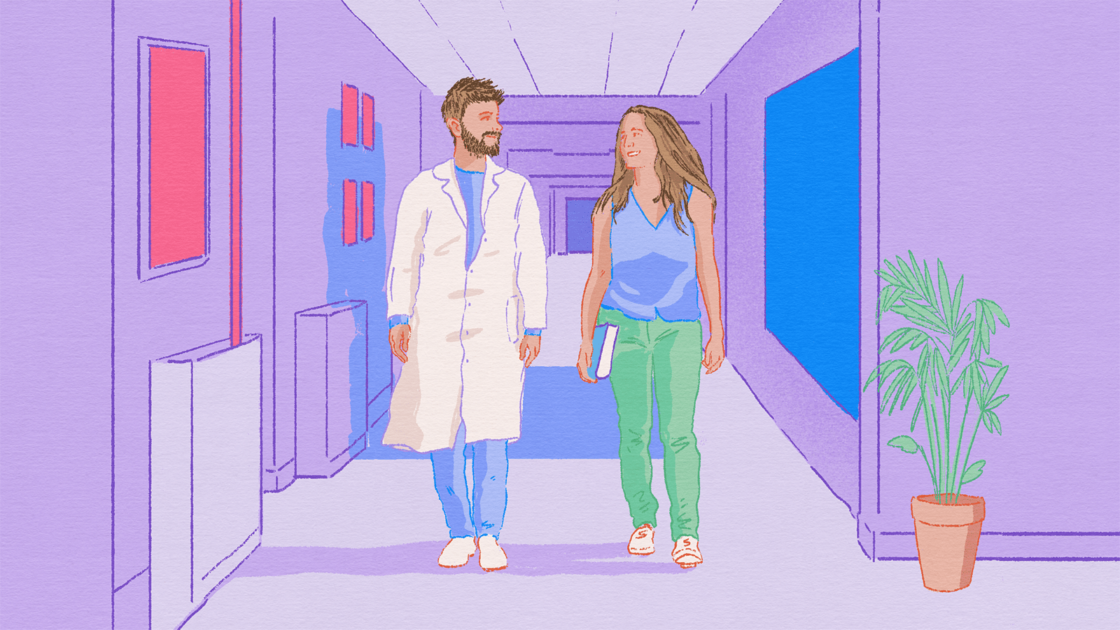What is inpatient mental health treatment?
Inpatient care can be an appropriate treatment for people who are facing severe and complex mental health issues, but it can be scary if you don’t know what to expect

There is a broad range of different professional supports and services available in Ireland to support people in their mental health recovery. These supports and services are divided into different levels, depending on the severity of the mental health issues they are designed to treat.
While most mental health issues only require less intensive supports like outpatient therapy, if you are experiencing complex and long-lasting symptoms, or a mental health crisis, staying in the hospital for a period of time can be the best way to give you the level of treatment and support you need to keep you safe and help you cope and feel better. Staying in a psychiatric hospital to receive mental healthcare is called inpatient treatment. This article explains how inpatient mental health treatment works and what rights you have when you’re accessing inpatient care.
What is inpatient mental health treatment?
Inpatient mental health treatment involves staying in a psychiatric hospital for a period of time while a team of mental health professionals can monitor your symptoms and provide in-depth mental health treatment. There are psychiatric units across Ireland. These units are usually based inside general hospitals. Most people only receive this form of treatment for a short time until their symptoms have eased enough to be able to engage with less intensive mental health supports. The most common length of stay in inpatient treatment is around 2 weeks.
If you are over 18, you will attend adult inpatient care. Young people who are under 18 attend CAMHS inpatient care. Inpatient CAMHS are specialist services based in Dublin, Cork and Galway There are currently four inpatient CAMHS units in Ireland.
Why does someone need inpatient mental health treatment?
Inpatient mental healthcare is an appropriate treatment option for people who are experiencing severe symptoms that are having a significantly negative impact on their ability to function in their daily life. There is a range of mental health conditions that can sometimes require inpatient treatment. For example, people may benefit from this type of treatment if:
- They are experiencing suicidal thoughts or behaviours that can’t be managed at home
- They are unable to care for themselves (e.g. making meals, eating, personal hygiene)
- Their mental health issues pose a threat to themselves or others
- They are having hallucinations or out-of-control thoughts
- They need help managing their medication
- They have tried other mental health treatments and nothing has worked
- They are having severe and prolonged addiction issues and are having difficulty engaging with treatment in the community
- Their mental health condition has caused physical complications that need medical treatment
How do you access inpatient mental health treatment in Ireland?
You need a referral from your GP or another mental healthcare professional, most often a psychiatrist, to access inpatient mental health treatment. Inpatient care is usually used by people who are dealing with severe, long-term symptoms, so they will often have already tried other lower-level treatments in the past.
The majority of people who receive inpatient mental health treatment have chosen to go to hospital. If you choose to access inpatient treatment, you are known as a voluntary patient. If you are under 18, your parent or guardian must give consent on your behalf.
In some cases, a group of mental health professionals could detain you in hospital under the Mental Health Acts 2001-2018, even if you don’t want to be there. This decision is only made in rare circumstances, where it is believed that a stay in hospital is needed to keep you or others safe. If you are kept in hospital under the mental health act, you are known as an involuntary patient. If you receive an involuntary admission, a solicitor is appointed to you to defend your rights at a tribunal that must happen within 21 days. You can find more information about your rights as an involuntary patient below.
What is inpatient mental health treatment like?
When you first get to an inpatient mental health unit, you will go through an admission process. During this process, a member of your care team will take time to assess your needs so they can develop a care plan that will work for you. They will have a list of questions for you about things like your current symptoms and any medications you’re taking.
You will have an opportunity to ask any questions you have about your care. You may get your blood drawn or be asked for a urine sample so they can get a picture of your physical health. Inpatient units have rules about clothing, accessories, and food to help keep patients safe. You will be told about these rules during the admission process. In some cases, you might also be searched for safety purposes.
If you know ahead of time that you have an inpatient stay coming up, you can pack a bag of comfortable clothing ahead of time. You may not be allowed to take some clothing accessories like belts and shoelaces into the unit for safety reasons.
Inpatient units follow a daily schedule with regular mealtimes, activities, individual, group, or family therapies, and times when you can rest or do things you enjoy. Weekends have less structure and tend to have more free time. You are allowed visitors while you’re in inpatient care. Visiting hours usually happen at set times either once or twice a day, and you may only be allowed a certain number of visitors at one time.
You will often be allowed to have your phone, but if you don’t have access to your own device, payphones will be available to call loved ones.
While receiving inpatient psychiatric treatment, it’s important to note that you may see others who are facing challenges that are similar to, less intense than, or more intense than your own. Though it may be distressing and challenging, over time, it can show you how others manage their mental illnesses.
For many people who receive inpatient care, their treatment will last around 14 days, but some will be in for longer or shorter times. Everyone’s experience of inpatient care is unique. The length of time you spend in treatment doesn’t represent how successful your recovery is.
Your care team should maintain an open line of communication with you about your treatment throughout your time in inpatient care. You should always be fully informed about your mental healthcare and you should feel listened to and supported. They should work with you to develop a care plan that meets your needs.
What are the benefits of getting inpatient support for mental health issues?
Inpatient treatment has a number of benefits:
- By staying in hospital, you have care from a multidisciplinary mental health team. This means you’ll have emotional and medical support from a highly trained team.
- Receiving inpatient treatment also gives your days a reliable structure that can be really helpful. Your day will be filled with different therapeutic activities that support your recovery.
- Inpatient care can give you a break from your home environment. Staying in a hospital means you’re in a safe place and get to spend time away from your usual living situation. It gives you time and space to focus on your wellbeing.
- If you are living with an addiction, you can detox in a safe and supported way.
- You have the opportunity to receive peer support from other people who are also experiencing mental health issues.
Who will be treating me while I’m in inpatient care?
During your time in inpatient care, you will have a care team who will work together to provide the supports and treatments that meet your needs. Care teams contain a combination of different healthcare professionals with different types of training and qualification. This means the different team members bring different skills and, together, they can treat all the different aspects of your condition.
Your care team is tailored to suit you, so you might not work with all of these people, but your care team can include:
- A consultant psychiatrist: A consultant psychiatrist is a doctor who specialises in mental health conditions. They can diagnose you with mental health conditions and prescribe treatments including medications. They usually lead your care team.
- Clinical psychologists help you to find ways to cope with your mental health problems by delivering therapies. They are trained in a wide range of assessments and therapeutic approaches and will use a therapy, or a mixture of therapies that best fit your needs.
- Nurses work closely with you and your family to support your recovery and mental wellbeing.
- Medical doctors diagnose and treat any physical symptoms you might be experiencing.
- Occupational therapists find practical ways to help you to live your day-to-day life independently. They support with things like looking after yourself, work life, and social life.
- Social workers help you with social problems or issues with the people in your life like your family. They work with you and your family to help you make changes and solve problems.
Depending on your needs, your care team could also include professionals like dietitians, physiotherapists and speech and language therapists.
How long will I have to stay in hospital and can I leave?
If you are a voluntary patient in inpatient treatment who wants to leave, your consultant psychiatrist or a doctor or nurse on your care team may detain you for up to 24 hours if they think your mental health issues are severe enough that they pose a significant threat to yourself or others.
If you are under 18 and your parent or guardian wants to remove you from the hospital, the professional may have you temporarily detained and placed in the custody of the Health Service Executive if they think you pose a threat to yourself or others.
After 24 hours, your consultant psychiatrist must either discharge you or, if they still have concerns about your safety, arrange for an examination by another consultant psychiatrist. If the second consultant also believes you are at too much risk to leave, they must issue a certificate called an admission order stating that you should be detained. Otherwise, they must discharge you. If you are detained, you are then considered an involuntary patient. An admission order allows for you to be kept in inpatient care for a period of 21 days. If, at the end of the 21 days, your consultant psychiatrist still believes that you need to be kept in for your safety, they can sign a renewal order to extend your stay.
What are my rights when I’m receiving inpatient mental health treatment in Ireland?
You have rights whenever you’re receiving any mental health treatment, including inpatient treatment. These rights are outlined in the Mental Health Acts 2001-2018. These acts make sure that the patient’s best interest is the most important aspect of their mental health treatment. This means that your care team while in inpatient care has to consider your best interest before they make any decision about your care and treatment. Your care team should have discussions with you about where your best interest lies to help you in your recovery.
You have the right to be treated with dignity and respect and the right to be listened to by all those working on your care team. You are entitled to take part in decisions that affect your health and your care team should consider your views carefully. They should also take time to make sure you are fully informed about your legal rights, your admission and your treatment.
What are my rights as an involuntary patient in Ireland?
In rare cases, a group of mental health professionals could keep you in hospital against your will to keep you safe. Even though you cannot leave when you choose, you still have rights as an involuntary patient. You must be made aware of your rights within the first 24 hours of your involuntary admission to hospital. This will involve your consultant psychiatrist giving you a written statement explaining your rights during your stay. This statement should contain the following information:
- When your admission order or renewal order was made
- What treatments have been recommended for you during your stay
- That you may stay in the hospital as a voluntary patient
- That you have the right to a solicitor
- That your involuntary stay will be reviewed by a Mental Health Tribunal
- That you can appeal the decision of the Mental Health Tribunal to the Circuit Court
- That you may contact the Inspector of Mental Health Services if you want to make a complaint
- That you can request a second review of your admission order after 3 months if your stay is for longer than 3 months.
Your consultant psychiatrist must also let the Mental Health Commission know about your admission within the first 24 hours so they can organise an independent review of their decision called a mental health tribunal. Mental health tribunals help make sure that the law was followed when you were admitted to hospital. Tribunals are held to support you and to protect your rights. As part of the tribunal, a lawyer will be assigned to you free of charge. They will represent you and help you at your Tribunal.
The Mental Health Commission has a booklet that explains the rights that involuntary patients have in Ireland. This booklet has been designed to help people understand more about your stay in hospital and their rights as an involuntary patient as outlined in the Mental Health Acts 2001 – 2018. The information in the booklet is based on questions commonly asked by patients.
Can I make a complaint about my inpatient care in Ireland?
Yes. Whether you are a voluntary or involuntary patient receiving mental health treatment, you have a right to make a complaint about the care you are receiving. Each hospital has a complaints procedure in place and has a specific person you can contact if you want to make a complaint. If you don’t feel comfortable making a complaint in person, you can also make it over the phone or in writing.
You can also contact the Mental Health Commission if you have a concern about your care. The Mental Health Commission promotes high standards and good practices in mental health services in Ireland. They do not have the legal powers to investigate complaints themselves but they can point you in the right direction. Email any concerns to: [email protected]
The Mental Health Commission may direct you to the Inspector of Mental Health Services. The inspector is responsible for making sure regulated mental health services in Ireland are providing a good level of care. They visit these services every year to make sure this is happening. If the inspector or assistant inspectors from the Mental Health Commission are visiting the hospital where you are receiving treatment, you have a right to talk to them and they will ask if you would like to speak to them.
If you would like to locate an inpatient facility and read its most recent inspection reports, click on Find a centre.
If you want some practical advice and know your rights in a CAMHS inpatient centres, click on the link Headspace Toolkit.
If you need to access the information in different languages, click on the link Information for patients.
If you would like to make an advance healthcare directive, click on the link Advance Healthcare Directives.
Feeling overwhelmed and want to talk to someone?
- Get anonymous support 24/7 with our text message support service
- Connect with a trained volunteer who will listen to you, and help you to move forward feeling better
- Whatsapp us now or free-text SPUNOUT to 50808 to begin.
- Find out more about our text message support service
If you are a customer of the 48 or An Post network or cannot get through using the ‘50808’ short code please text HELLO to 086 1800 280 (standard message rates may apply). Some smaller networks do not support short codes like ‘50808’.






